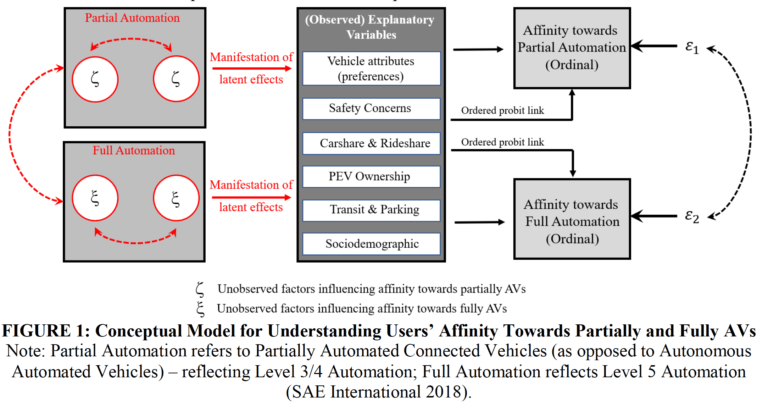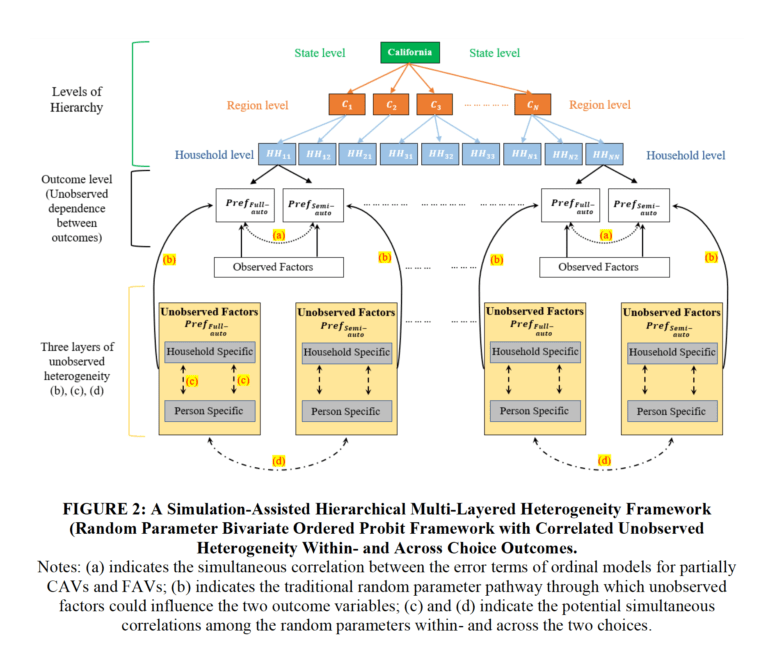Partial & Full Automation

An adequate understanding of consumer affinity towards automated vehicles (AVs) is necessary to reliably forecast the potential impacts of AVs on urban systems. The road to full automation pass through partially automated driving systems. In addition, to realize greater benefits over longer time, cooperation and/or connectivity must be integrated into AVs.However, our existing understanding of consumer affinity towards partially (level 3/4) connected automated vehicles (CAVs) and fully (level 5) automated vehicles (FAVs) is extremely limited.
In this project, we will simultaneously analyze consumer affinity towards partially CAVs and FAVs and develop a comprehensive behavioral framework to examine how consumer affinity towards AV technologies relate to users’ behavioral and attitudinal predispositions, sustainable travel behavior, and users’ valuation of different vehicle attributes & safety concerns.
Real-world choices & preferences are overly complicated. We will develop a comprehensive behavioral framework to capture taste heterogeneity at different geographic/ecological levels (from region to household level, and further within and across the choices for partially CAVs & FAVs). By harnessing detailed individual-level behavioral preference data, we will develop a novel simulation-assisted heterogeneity-based bivariate discrete outcome framework with multiple layers of taste heterogeneity.

We anticipate that the findings from this project will provide a deeper understanding of how attitudinal predispositions, travel behavior, and priorities towards different vehicle attributes may impact the affinity towards partially CAVs and FAVs across diverse sociodemographic cohorts. By reflecting the users’ preferences towards CAVs and FAVs and characterizing taste heterogeneity at multiple levels, we expect that the findings from this project can be integrated in larger travel forecasting models to more accurately predict the future-use and ownership patterns of AVs.
Publications:
Wali, B., Santi, P., Ratti, C. (2021) Modeling Consumer Affinity Towards Adopting Partially and Fully Automated Vehicles – The Role of Preference Heterogeneity at Different Geographic Levels. (Revision submitted – Transportation Research Part C: Emerging Technologies).
Wali, B., Santi, P., Ratti, C. (2021) Modeling Consumer Affinity Towards Adopting Partially and Fully Automated Vehicles – The Role of Preference Heterogeneity at Different Geographic Levels. (Revision submitted – Transportation Research Part C: Emerging Technologies).
Major Contributors:
Paolo Santi, Ph.D., Principal Research Scientist, MIT Senseable City Lab.
Carlo Ratti, Ph.D., Professor & Director, MIT Senseable City Lab
Acknowledgements: We thank all the members of MIT Senseable City Lab consortium for supporting this research.
Paolo Santi, Ph.D., Principal Research Scientist, MIT Senseable City Lab.
Carlo Ratti, Ph.D., Professor & Director, MIT Senseable City Lab
Acknowledgements: We thank all the members of MIT Senseable City Lab consortium for supporting this research.